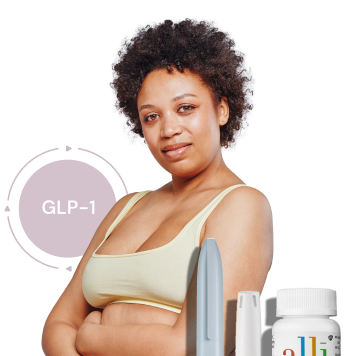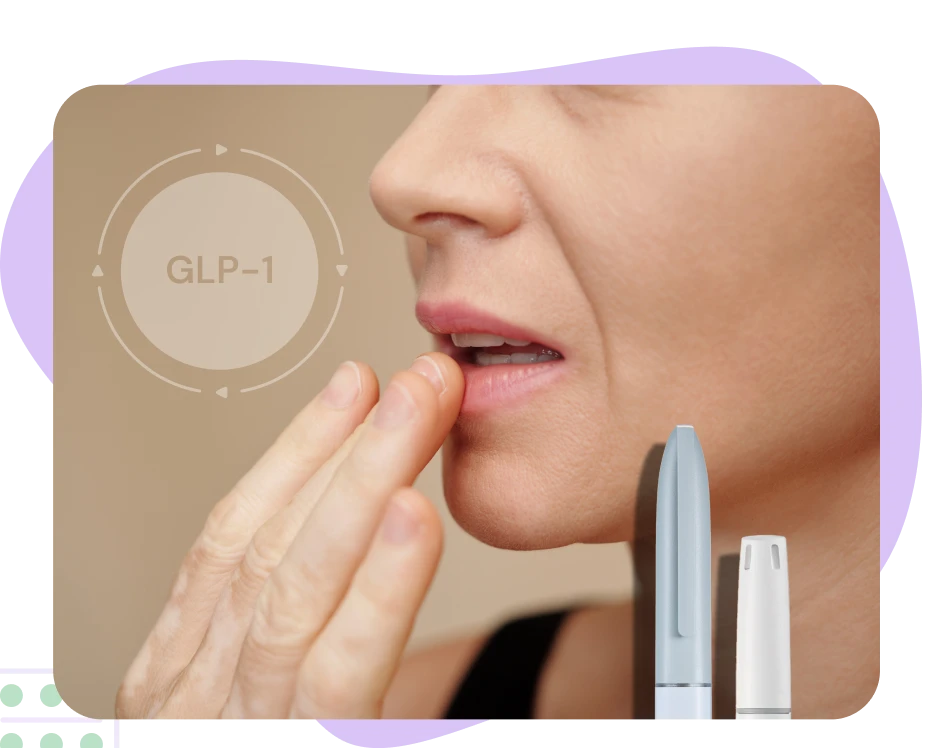Dry mouth (xerostomia) is a side effect experienced by some individuals using GLP-1 receptor agonist injections for weight loss treatment. This condition occurs when the salivary glands don’t produce enough saliva to keep the mouth moist.
While the exact mechanism isn’t fully understood, it may relate to GLP-1’s effects on fluid balance, autonomic nervous system regulation, or as a secondary consequence of other side effects like nausea or reduced fluid intake.
Key symptoms
- Persistent feeling of dryness or stickiness in the mouth
- Thick, stringy saliva
- Difficulty speaking, chewing, or swallowing
- Altered taste sensation
- Cracked lips or sores at the corners of the mouth
- Increased thirst
- Potential oral health issues including bad breath and increased risk of dental decay
How common is dry mouth with GLP-1 treatments?
Dry mouth is less frequently reported than gastrointestinal side effects but may also include bad (sulphur-smelling) breath. This symptom may be more noticeable during the initial weeks of treatment or following dose increases and tends to improve over time for many patients as the body adjusts to the medication.
Managing dry mouth whilst on GLP-1 treatments
Hydration strategies
- Increase water intake throughout the day with regular small sips
- Carry a water bottle with you at all times
- Limit caffeine and alcohol consumption as these can worsen dehydration
- Use a humidifier at night to add moisture to the air
- Breathe through your nose rather than your mouth when possible
Oral care adjustments
- Choose alcohol-free mouthwashes specifically designed for dry mouth
- Use fluoride toothpaste and mouth rinses to protect against dental decay
- Chew sugar-free gum or suck on sugar-free sweets to stimulate saliva production
- Consider artificial saliva products (sprays, gels, or lozenges)
- Schedule more frequent dental check-ups while experiencing dry mouth
Dietary modifications
- Avoid salty, spicy, or acidic foods that may irritate a dry mouth
- Include moist foods in your diet (soups, stews, yoghurt)
- Add sauces or gravies to drier foods
- Sip water whilst eating to aid in chewing and swallowing
- Avoid sugary foods and drinks that can increase risk of dental caries
Medical approaches
- Discuss with your healthcare provider about potentially adjusting medication timing or dosage
- Prescription saliva stimulants may be beneficial in severe cases
- Consider over-the-counter saliva substitutes recommended by your healthcare provider
When to seek medical advice
Contact your healthcare provider if you experience:
- Severe dry mouth that significantly interferes with eating, speaking, or sleeping
- Mouth sores or infections that don’t heal
- Signs of dental problems (pain, sensitivity, visible decay)
- Difficulty swallowing due to lack of saliva
- Symptoms that don’t improve with self-management strategies
Long-term outlook
For most patients, dry mouth symptoms either improve over time or can be effectively managed with the strategies outlined above.
FAQs
Will dry mouth affect the effectiveness of my GLP-1 treatment?
No, experiencing dry mouth does not reduce the weight loss or blood glucose control benefits of GLP-1 medications.
Can dry mouth increase my risk of dental problems?
Yes, reduced saliva can increase risk of tooth decay and gum disease, making good oral hygiene and regular dental visits especially important.
Should I stop taking my medication if I experience dry mouth?
Do not discontinue your medication without consulting your healthcare provider. In most cases, dry mouth can be managed effectively with the strategies outlined above.
Are there any specific foods or drinks I should avoid?
Limit alcohol, caffeine, acidic juices, and carbonated beverages, which can worsen dry mouth symptoms. Also avoid sugary foods and drinks that increase dental decay risk.
Is dry mouth from GLP-1 medications temporary?
For many patients, dry mouth symptoms improve over time as the body adjusts to the medication, particularly if good hydration practices are maintained.





























